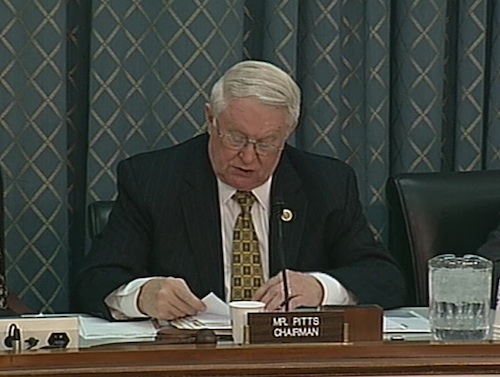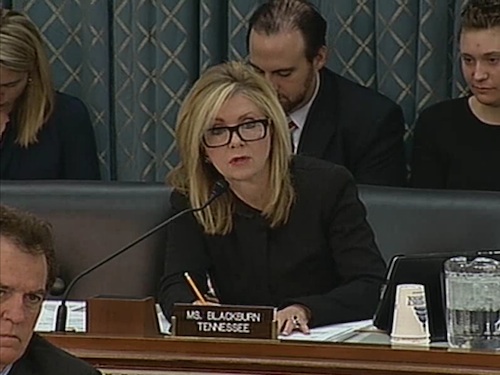 Rep. Joseph Pitts (R-PA)
Rep. Joseph Pitts (R-PA)
This week the US House of Representatives' Energy and Commerce Committee's subcommittee on Health held a hearing to discuss the "Federal Regulation of Mobile Medical Apps and Other Health Software", which ended up being a partial re-run of the committee's FDA-apps hearings back in March. This time around, however, the committee stacked the witness table with supporters of Rep. Marsha Blackburn (R-TN)'s recently proposed bill, the SOFTWARE Act, which aims to limit the FDA's authority to regulate medical apps and other health IT software that function like medical devices.
Blackburn first mentioned her plans for the bill on Fox News in March, when she announced: “I have draft legislation which is coming out, which would be an express prohibition, prohibiting the FDA from getting into these mobile medical applications as a healthcare medical device,” she said at the time.
This week's hearing included a relatively short discussion with a panel of industry representatives. Notably, the second panel included two members of the Health IT Now Coalition -- which led the campaign to delay the FDA's final guidance for mobile medical apps in 2012 -- and two members of the Bipartisan Policy Center -- which has expressed its support for the SOFTWARE act already and even noted how it "mirrored" its own proposed health IT regulatory framework. Congress only invited one witness to the hearing who advised against passing the SOFTWARE Act, Qualcomm's Senior Director of Government Affairs Robert Jarrin, who, following his prepared testimony, was largely ignored.
The vast majority of the hearing, however, was dominated by a discussion with the FDA's Director of its Center for Devices and Radiological Health Dr. Jeff Shuren. Here's how the subcommittee chairman Rep. Joseph Pitts (R-PA) kicked off the conversation with Shuren:
 Rep. Marsha Blackburn (R-TN)
Rep. Marsha Blackburn (R-TN)
"In September of this year, the FDA put forward a proposal, in the form of final guidance, indicating that software was a medical device for the purposes of regulation -- except that software is not a medical device. To regulate it as such, the FDA has said it will use discretion to decide which software to regulate. Except that no matter what Dr. Shuren may tell this committee here today, there is no guarantee that his successor won't go back on this guidance tomorrow. While guidance is a valuable tool for the FDA, there is a significant limitation -- certainty. What stands today could change tomorrow."
While stressing that the FDA's regulation of medical devices is complicated, Shuren took pains to explain that medical device makers don't need to manufacture hardware anymore. The rise of mobile devices has changed that.
"Manufacturers don't have to make the hardware anymore," Shuren said, "because they now have ubiquitous hardware that a software maker can simply take advantage of. That's the way the world is changing. All we are saying is, the functions -- when they stay the same -- treat them the same, because the impact and the risk to patients is the same. Simply because they got smaller and I can pick it up and walk out of the room with it, doesn't change the risk to the patients. Why for that reason alone would we treat it differently?"
Rep. Henry Waxman (D-CA) helped back Shuren's implication that this issue was far more complex than most of the legislators in the room were framing it: "There can be real complexity in what look like simple definitions."
Shuren also reminded the legislators again and again that because of the FDASIA legislation (which Congress already passed), FDA is working with ONC and FCC on a report that would propose ideas for a new risk-based health IT regulatory framework. This report will be delivered to congress during the first quarter of 2014, Shuren said, and -- when asked -- he agreed that Congress should wait to legislate on health IT software regulation at least until the legislators read the report.
"We do [think Congress should wait to pass legislation] because we have a wealth of information to provide back," Shuren said. "Like I said [before], Congress can decide at any moment if you all want to pass legislation. It is your discretion to do so. We would like to make sure that any decisions made are with full information... All we are asking is: Sometimes moving quickly can lead to unintended consequences that can be very hard to undo once they're done. That is all we are really trying to put on the table."
When prompted, Shuren shared the FDA's take on the SOFTWARE Act: "It's very confusing to us what this actually accomplishes."

















